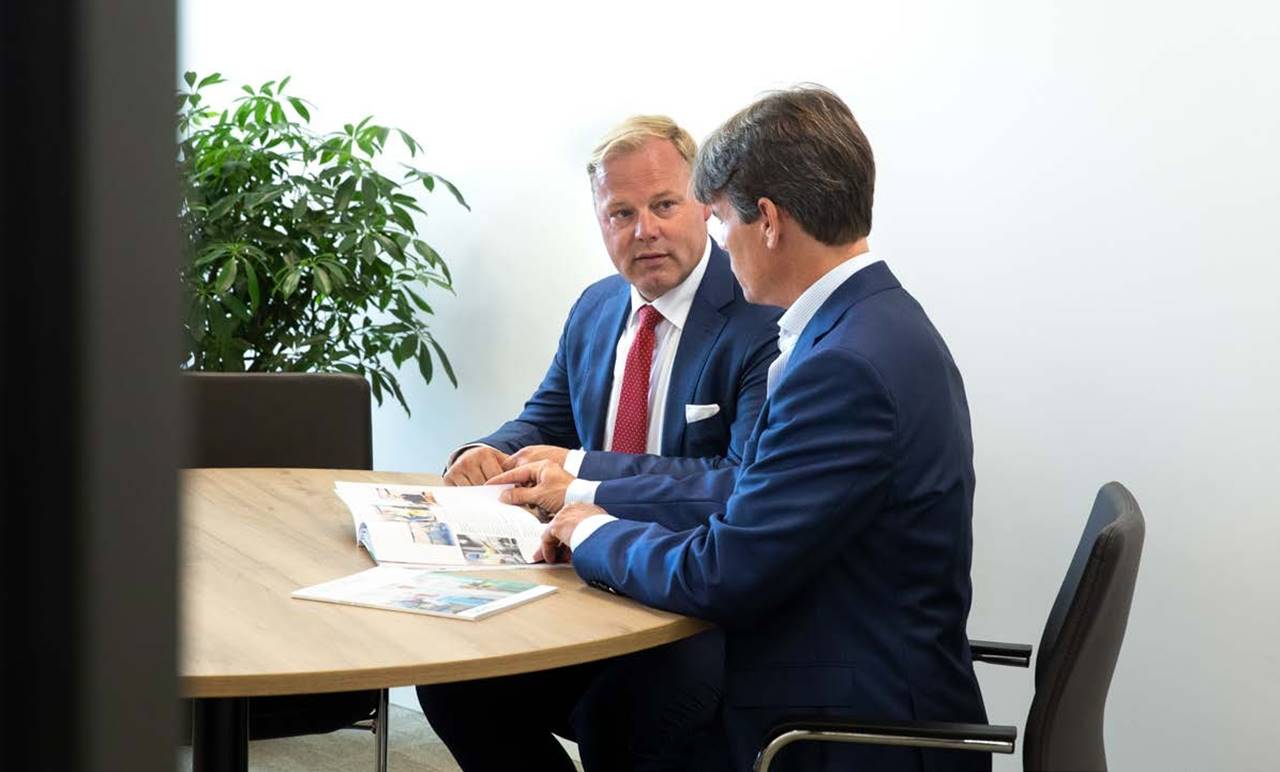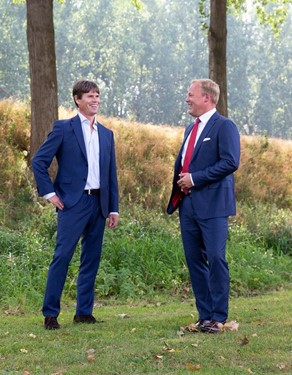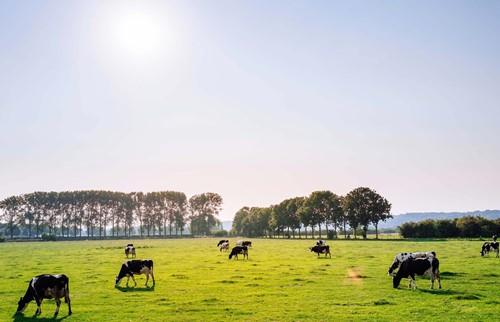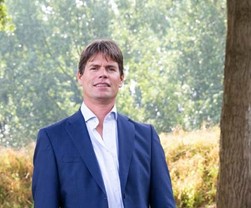About Positive Portrayal, Sustainable Meat, and Robotization
The Dutch meat sector is facing a lot of challenges. VH Matters had a conversation about current developments, risks, and opportunities with Laurens Hoedemaker, the new president of Dutch advocacy organization COV (Central Organization for the Meat Sector), and “our” Rob Schouten. Schouten, besides being Van Hessen’s CCO, responsible for the sales of natural casings, is president of Dutch trading organization HBS (The Association of Traders and Processors of Slaughtered Products). As the president of the HBS, he is also a board member of COV which means he and Laurens know each other well. A Conversation With Laurens Hoedemaker and Rob Schouten About Challenges in the Meat Sector. The COV accomplishes many things for the sector. Whether it is contacting the Dutch Food Safety Authority, facilitating collective labor regulations, managing difficult issues such as Brexit, or organizing promotional campaigns both domestic and abroad. For this reason, Hoedemaker, as president of the COV, is the ideal person to shed his light on the current developments, while Schouten with his in-depth knowledge of the natural casings industry, is well suited to interpret this for Van Hessen.

Perception
Until recently, Hoedemaker was Director of the Royal Dutch Hunter’s Association, where he was able to bolster public support for hunting in the Netherlands. Hoedemaker joined COV with the same objective. “We need to enter into a dialogue with society at large,” he claims, “We need to show that we make a substantial contribution to a healthy diet. We supply a beautiful natural product and even provide products that are very important for public health such as heparin. This is why we have to emphasize the social value of the meat sector. This work includes debunking misconceptions. It is not true, for instance, that you get colon cancer from regularly eating steak.”
Though Hoedemaker wants to influence public opinion, he is also willing to critically examine the meat sector so as to do things better. “You can only tell your story effectively and authentically when you are visible and open. You have to show what it is you do and make clear that you’ve got nothing to hide. Our sector has to critically examine itself and, if needed, do things differently. Sometimes this is necessary and it’s best to be honest about that.”
Whatever the case may be, it is clear that something needs to change. The meat sector needs to show what it has to offer. For too long, there has been a negative perception regarding the meat industry, whether that had to do with the meat processing itself or with the impact it had on society. “For this reason, we have started a campaign about eating meat in The Netherlands. Over the next three to five years, we hope to be able to change misconceptions and offer an answer to the concerns that consumers have about meat. But more than anything, we’re going to tell our own story.” This may cost the organization a hefty sum of money but it’s worth the investment. The COV takes this challenge very seriously. “I recognize the picture of a negative perception that Laurens paints regarding the sector,” affirms Rob. “The arguments for sustainability and health are mixed up. Eating meat is not unhealthy at all. Meat offers important nutritions and is, therefore, part of the major food groups that form a healthy diet. The sector is aware that many things can be improved and it works hard to do so. Van Hessen is a perfect fit for the positive perception the sector wants to create. Through our valorization processes, we bring meat byproducts back into the food chain. This way we contribute to sustainability.”
Hoedemaker believes the perception challenge is also related to the way political decisions are made. “In the past, it was sufficient to have the right connections at the department to positively influence official policy. Nowadays, politics, press, and social media have a much greater influence. A different way of policymaking is the result. Think about that what you may, but it is important to speak with a clear voice to counter the effects of the anti-meat lobby if only to provide politicians with balanced information from society at large.”
‘Nowadays, politics, press, and social media have a much greater influence’

Challenge of increasing meat consumption
Besides experiencing pressure from public opinion, there are a few other challenges that come into view. According to estimates, the worldwide need for protein will increase by 65% over the next 40 years. On top of that, there is the enormous challenge to make our entire economy green. A worldwide increase in meat production will have to be accompanied by a large-scale sustainability effort. What does this mean for the Dutch meat sector?
According to Hoedemaker, it is difficult to anticipate how the meat sector is going to respond to the increasing meat consumption in the world. “The Netherlands predominantly produces meat for our region in Northwest Europe. In principle, it shouldn’t make too much of a difference. At the same time, those faraway markets are important for the effective and complete valorization of the slaughtered animal. Pork trotters and stomachs, for instance, are byproducts here but they are considered a delicacy in China. Instead of us throwing away byproducts or processing them into feed, we should be able to sell them as a high-quality products for an honest price given consistent worldwide demand. As a result, we can sell pork tenderloins slightly cheaper here.” “Of course, we are fully aware of the opportunities for Dutch meat byproduct,” says Schouten, “but there is another perspective to this story that is even more important for us. As a company that operates globally, we have a presence in up-and-coming economies. With the knowledge we have gained we can clean casings there in a sustainable way. More meat production there means more opportunities for us to valorize. In other words, our market does increase with a growing worldwide demand for protein.”
Farm to Fork
The call for sustainability is becoming louder. It is noticeably heard from Brussels where recently the Green Deal was introduced. What are the implications of this comprehensive package of measures and regulations for the Dutch meat sector? “The Green Deal touches our sector on important points such as the European Union’s Farm to Fork Strategy and certain demands concerning biodiversity. We will be required to have plans in place in the area of health, safety, sustainability, animal wellbeing, etc. A good thing is that The Netherlands is already leading the pack in Europe concerning these developments. I see opportunities here.” According to Hoedemaker, there are some difficulties with the execution of these plans on the ground, however. “Priority of the new policy is that a much larger percentage of farming needs to be organic. In 2030, 25% of arable land needs to be organic. With all due respect, this will not be sufficient to feed everyone. Organic farming is a dated sustainability concept. Organic was the rallying cry 25 years ago. With modern precision-agriculture based on the latest technology, we can achieve much more for human beings, animals, and the environment.” Schouten too, cannot reconcile the demanded increase in organic farming with the expected increase in demand for protein. “Of course, Van Hessen does not determine the origin of the slaughtered animal but our argument is the same: innovation! We need to focus on valorization and further optimization of yields in the gutroom.”
Hoedemaker agrees we should rather look at ways in which we can take the next step with our modern environmentally aware production methods in producing high-quality food. “What we need is policies that help us to produce good and safe meat together with the right attention for landscape development and proper biodiversity. Both are indeed under pressure, also in The Netherlands. Changes are therefore required. But this does not imply that we simply leap back to pre-agricultural revolution methods. The challenge is to create products that are safe and wholesome and yet meet those demands.”
‘With all due respect, organic agriculture and animal husbandry are an outdated concept. It will not be enough to feed everybody’
Three Issues
According to Hoedemaker, three issues are particularly pressing when it comes to implementing the Farm to Fork Strategy. The first one deals with the question of how to realize a climate-neutral food chain. “At which level should one approach this, globally, per continent, nationally, or per individual? Or put another way, do I do this at the level of what I eat on average or by looking at what is literally on my plate at this very moment? The more detailed this becomes, the more impossible and unrealistic the objective. We should be careful not to mix up the short CO2 cycle of animal-based food (12 years) with the CO2 emissions of fossil fuel. Please, let’s focus on fossil fuels. As far as I know, that’s where the real problem is.”
The second issue touches on the availability of enough food for everyone. “Relevant for this issue is the question that keeps circling of whether we should produce meat for The Netherlands alone. If that were indeed the objective, production could decrease in the coming years. At the same time, however, we hear the call for sustainability. If we can sustainably produce meat in The Netherlands, why would we increase the impact on the environment by moving meat production away from our country? Besides, due to climate change, there is less and less land available in Southern Europe to do this.”
The third issue concerns the affordability of sustainable food. How does one achieve an honest distribution of income such that the most sustainable food is also the most affordable? “It is debatable whether plant-based food is sustainable because you need to consume 30% more plant-based proteins to be able to absorb the same amount of amino acids you get with meat. I also have my doubts about the calculations of the so-called fair prices calculated by, for instance, the True Animal Price Coalition. Their efforts lean heavily on producers of meat replacement products. This organization’s calculations are also unrealistic. Of course, sustainable food needs to be affordable. That’s why I think it is important to make deals with supermarkets about production methods. There are already good examples of supply chain cooperation that result in market concepts with benefits for sustainability or animal welfare, such as “1-star pork.” But a new meat tax, as some suggest? No, recent research shows that this is impracticable and that it doesn’t work.”
Schouten is also not very excited about a meat tax. “Fact is, we are already deeply engaged in the Farm to Fork Strategy by producing safely and transparently. We take good care of our people and maintain fair prices with our customers and suppliers. Any meat tax would simply put us at a disadvantage,” concurs Rob. “You could do this for the whole of Europe but even then that tax ought to benefit the sector so it can invest in sustainability.”
The Employment File
Both gentlemen also discuss employment issues in the sector. “At this moment there are more vacancies than unemployed people. That’s a good thing,” says Hoedemaker, “but for the meat sector, this entails a big challenge. Work in the meat sector is demanding. For this reason, there has been a shift to workers from abroad. But even the foreign labor market is coming under pressure. Poland, for instance, makes it increasingly unattractive for Polish migrant workers to work abroad. Understandably, they need these people in Poland. Migrant workers also find alternative options besides the meat sector, even in The Netherlands. For these reasons, the meat sector is having a hard time finding employees. All this means that we have to start paying higher wages or offer different contracts. This then results in more pressure on margins that are already small in our industry.”
“We fully recognize the problems associated with flex workers at Van Hessen,” says Schouten. “At the same time, many of the processes in the gutroom require great skill. We, therefore, need well-trained employees. To make this work, we ensure the labor is attractive for them by using job rotation and offering possibilities for growth. We do experience the same shortage of people, though. That’s why we, like others in the industry, are exploring robotization and mechanization.”
Hoedemaker believes that the current system has had its best day. He also thinks the solution is to be found in permanent contracts and mechanization: “We are considering hiring temps ourselves, just like they do in Germany, to create a stronger sense of belonging. We also need to look ten years ahead into the future with an eye toward automation and robotization. As Rob says, it is possible to realize more integrated mechanization than we currently have. The meat sector should be at the forefront of this development.”
‘As a vertically integrated company, Van Hessen is present in the entire supply chain and able to face threats’
Threats and opportunities
Even though many things are facing the sector in the years ahead, Hoedemaker sees more opportunities than threats. “The best thing you can do is to treat a threat as a complaint. A complaint is always an opportunity to do something better or to explain why things happen a certain way. Explanations create understanding for what you are doing and how you’re doing it. Certain points of criticism are justified, of course. We need to take them to heart so we may improve. I’ll be perfectly honest, at the end of the day I’m grateful for the Animal Protection organization in The Netherlands as they stimulated us to reach the highest level of animal wellbeing in both Europe and the world.”
Speaking on behalf of Van Hessen, Schouten sees a lot of potential in the way the company is structured. “Van Hessen is a vertically integrated company. Because we’re present in the entire supply chain, we are well-positioned to face threats and make the best of any opportunity that presents itself.”


